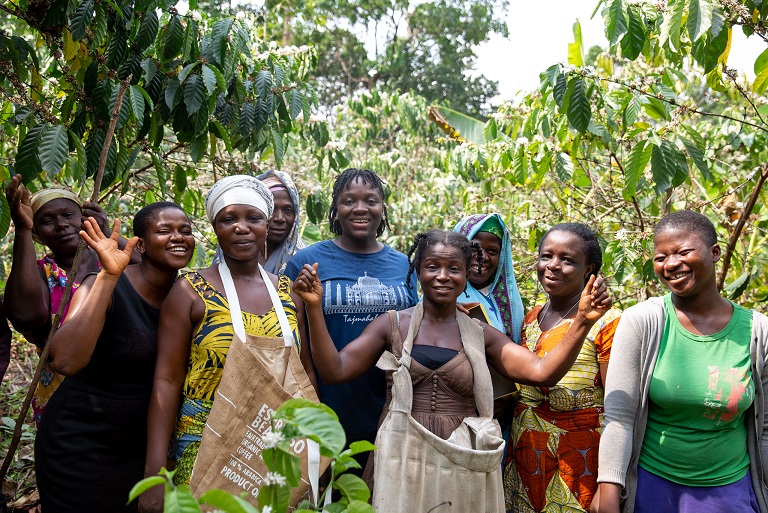Ghanaian coffee entrepreneur fuses social impact with business ambitions
In the mountainous town of Leklebi, within the Volta Region of Ghana, a group of women sing as they harvest Robusta coffee beans: “Coffee is good ohhh. Coffee is going to send our children to school.” The women’s small farm is among 19 others in Leklebi that sell the coffee they produce to Kawa Moka coffee company, founded by 34 year-old Emi-Beth Quantson in 2015.
Quantson first attempted starting a coffee business in 2007. For her final year project on entrepreneurship at Ashesi University, then located in Accra, she set up and operated The Lounge, a student hangout on campus. “I had no idea where to get a coffee machine, where to get [filter] coffee … so we ended up serving Nescafé instant coffee like everyone else,” she said.
After graduating, Quantson continued to run The Lounge, combining the stint with her Association of Chartered Certified Accountants (ACCA) examinations and her job at PricewaterhouseCoopers (PwC). She eventually stopped running The Lounge in 2010, as Ashesi prepared to relocate away from Accra. All this while, her interest in coffee shops as spaces for connecting with others grew. She was finally convinced to foray into the coffee shop business after experiencing Nairobi Java House—a coffee shop chain—in Kenya, where PwC transferred her to work from 2011 to 2013. “Every time I would go there, I would think: ‘Yes, this is exactly what we need in Ghana,’ ” Quantson said.
With this epiphany, she resigned from PwC upon returning to Ghana. “Of course I was a little scared … my career prospects at PwC were bright. But I knew that if I didn’t explore entrepreneurship then, I would be less likely to do so as I climbed the corporate ladder.”

Entering the coffee business
Quantson began her transition by consulting independently for organizations that were focused on developing entrepreneurs. Through her work with the African Leadership Network, she gained insights into how various companies are built across Africa and met successful entrepreneurs who encouraged her to pursue her business idea. Quantson also managed a program that was run by Impact Business Leaders in partnership with Ashesi; the program guided workers through their transition from the corporate world into social enterprise jobs. “I could relate to this program. I felt I could always do more. I didn’t just want to save people a lot of money. Going through that course helped me think about the social impact aspect of my business,” she said.
Inspired by her mother’s work providing legal representation to disadvantaged women, she decided that her coffee shop would employ abused women; women who were going through the legal aid system; and young women from deprived backgrounds who had completed senior high school and were looking for employment to develop their skills.
In 2015, Quantson started operating Kawa Moka in collaboration with Impact Hub Accra, an incubator and co-working space. “They offered me space for the coffee shop on their premises in exchange for my accounting services,” she said. She initially funded the venture using her savings from work. She later secured $5,000 and 30,000 Ghana cedis ($5,206) through her participation in the Tony Elumelu Foundation Entrepreneurship Program and Ghana’s Presidential Pitch, respectively. With the support of her family, friends, and her customers especially, Kawa Moka broke even after a year of operating.
“I really enjoyed working with Emi. I had good training at Kawa Moka,” said Sylvia Lamptey, who worked as a waitress at Kawa Moka after completing her senior high school education. Formerly an orphaned street child, Lamptey has parlayed her work experience at Kawa Moka into operating her own catering business, which she combines with distance undergraduate studies in psychology.
Roasting locally-grown coffee beans
In 2019, Kawa Moka transitioned from a coffee shop business to focus fully on roasting locally-grown Robusta coffee beans. “We identified Leklebi as a community with very high quality coffee. We now work with the community to improve the quality of the coffee they grow and guarantee them a certain quantity of sales. It was important to us to add value locally. Although financing has been challenging, we are committed to this path,” Quantson said. “I believe we have the highest quality roasting machine at the moment, worth $40,000. We were trained by an American roasting expert. I am also a member of the Specialty Coffee Association, and therefore benefit from a lot of training and technical expertise.”
“Robusta tends to have more caffeine. Its flavour profile also tends to be more chocolaty, more nutty, whereas Arabica tends to be more fruity. Kawa Moka has recently added three new indigenous flavours. That’s ginger, dawadawa, and prekese coffee,” she added.
Kawa Moka has remained committed to supporting women by buying coffee from women farmers at fair prices and ensuring that the women who work for men farmers are adequately paid for the work they do. “We also train the women to grow coffee organically and are in discussions with the chief of Leklebi to have specific portions of land allocated to the women so that they can produce larger volumes,” said Quantson.
The women farmers are grateful for Kawa Moka’s support. “Emi-Beth motivates us women a lot,” said Betty Adza, one of the farmers.
For the long-term, Kawa Moka’s vision is to be a globally-known brand. “We want [our coffee] to be on shelves in major stores around the world,” Quantson said.